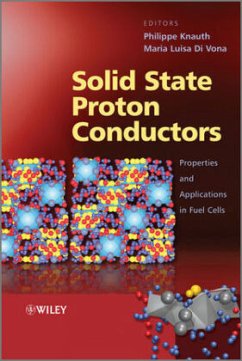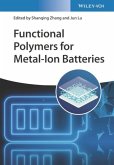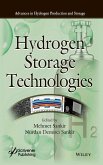Philippe Knauth, Maria Luisa Di Vona
Solid State Proton Conductors
Properties and Applications in Fuel Cells
Philippe Knauth, Maria Luisa Di Vona
Solid State Proton Conductors
Properties and Applications in Fuel Cells
- Gebundenes Buch
- Merkliste
- Auf die Merkliste
- Bewerten Bewerten
- Teilen
- Produkt teilen
- Produkterinnerung
- Produkterinnerung
Higher ionic conductivity, better mechanical strength, lower cost, and improved durability of proton-conducting materials are all important issues to accelerate the commercialization of fuel cell technology. This important book describes both inorganic and organic (polymeric) proton conductors, as well as their properties and their applications in fuel cells. Topics covered include microstructural properties, thermodynamic properties, mechanical properties, electrical properties, and applications in fuel cells. Fuel cell researchers and researchers in solid state ionics, physical chemistry,…mehr
Andere Kunden interessierten sich auch für
![Microbial Fuel Cells Microbial Fuel Cells]() Bruce E. LoganMicrobial Fuel Cells141,99 €
Bruce E. LoganMicrobial Fuel Cells141,99 €![Hybrid Systems Based on Solid Oxide Fuel Cells Hybrid Systems Based on Solid Oxide Fuel Cells]() Mario L. FerrariHybrid Systems Based on Solid Oxide Fuel Cells147,99 €
Mario L. FerrariHybrid Systems Based on Solid Oxide Fuel Cells147,99 €![Fuel Cells, Engines and Hydrogen Fuel Cells, Engines and Hydrogen]() Frederick J. BarclayFuel Cells, Engines and Hydrogen148,99 €
Frederick J. BarclayFuel Cells, Engines and Hydrogen148,99 €![The Power of Design The Power of Design]() Angele ReindersThe Power of Design113,99 €
Angele ReindersThe Power of Design113,99 €![Fuel Cell Systems Explained Fuel Cell Systems Explained]() Andrew L. DicksFuel Cell Systems Explained129,99 €
Andrew L. DicksFuel Cell Systems Explained129,99 €![Functional Polymers for Metal-Ion Batteries Functional Polymers for Metal-Ion Batteries]() Functional Polymers for Metal-Ion Batteries91,99 €
Functional Polymers for Metal-Ion Batteries91,99 €![Hydrogen Storage Technologies Hydrogen Storage Technologies]() Hydrogen Storage Technologies238,99 €
Hydrogen Storage Technologies238,99 €-
-
-
Higher ionic conductivity, better mechanical strength, lower cost, and improved durability of proton-conducting materials are all important issues to accelerate the commercialization of fuel cell technology. This important book describes both inorganic and organic (polymeric) proton conductors, as well as their properties and their applications in fuel cells. Topics covered include microstructural properties, thermodynamic properties, mechanical properties, electrical properties, and applications in fuel cells. Fuel cell researchers and researchers in solid state ionics, physical chemistry, polymer, and materials chemistry will benefit from this book.
Proton conduction can be found in many different solid materials, from organic polymers at room temperature to inorganic oxides at high temperature. Solid state proton conductors are of central interest for many technological innovations, including hydrogen and humidity sensors, membranes for water electrolyzers and, most importantly, for high-efficiency electrochemical energy conversion in fuel cells.
Focusing on fundamentals and physico-chemical properties of solid state proton conductors, topics covered include:
Morphology and Structure of Solid Acids
Diffusion in Solid Proton Conductors by Nuclear Magnetic Resonance Spectroscopy
Structure and Diffusivity by Quasielastic Neutron Scattering
Broadband Dielectric Spectroscopy
Mechanical and Dynamic Mechanical Analysis of Proton-Conducting Polymers
Ab initio Modeling of Transport and Structure
Perfluorinated Sulfonic Acids
Proton-Conducting Aromatic Polymers
Inorganic Solid Proton Conductors
Uniquely combining both organic (polymeric) and inorganic proton conductors, Solid State Proton Conductors: Properties and Applications in Fuel Cells provides a complete treatment of research on proton-conducting materials.
Proton conduction can be found in many different solid materials, from organic polymers at room temperature to inorganic oxides at high temperature. Solid state proton conductors are of central interest for many technological innovations, including hydrogen and humidity sensors, membranes for water electrolyzers and, most importantly, for high-efficiency electrochemical energy conversion in fuel cells.
Focusing on fundamentals and physico-chemical properties of solid state proton conductors, topics covered include:
Morphology and Structure of Solid Acids
Diffusion in Solid Proton Conductors by Nuclear Magnetic Resonance Spectroscopy
Structure and Diffusivity by Quasielastic Neutron Scattering
Broadband Dielectric Spectroscopy
Mechanical and Dynamic Mechanical Analysis of Proton-Conducting Polymers
Ab initio Modeling of Transport and Structure
Perfluorinated Sulfonic Acids
Proton-Conducting Aromatic Polymers
Inorganic Solid Proton Conductors
Uniquely combining both organic (polymeric) and inorganic proton conductors, Solid State Proton Conductors: Properties and Applications in Fuel Cells provides a complete treatment of research on proton-conducting materials.
Produktdetails
- Produktdetails
- Verlag: Wiley & Sons
- Artikelnr. des Verlages: 14566937000
- 1. Auflage
- Seitenzahl: 426
- Erscheinungstermin: 30. Januar 2012
- Englisch
- Abmessung: 253mm x 177mm x 25mm
- Gewicht: 982g
- ISBN-13: 9780470669372
- ISBN-10: 0470669373
- Artikelnr.: 34158377
- Verlag: Wiley & Sons
- Artikelnr. des Verlages: 14566937000
- 1. Auflage
- Seitenzahl: 426
- Erscheinungstermin: 30. Januar 2012
- Englisch
- Abmessung: 253mm x 177mm x 25mm
- Gewicht: 982g
- ISBN-13: 9780470669372
- ISBN-10: 0470669373
- Artikelnr.: 34158377
Philippe Knauth is Professor and Director of the Laboratoire Chimie Provence, University of Provence, Marseille, France. He has published 6 books, 2 European and 2 US patents, 200 publications, including 95 papers in international journals and 35 invited/plenary talks at international conferences. Maria Luisa Di Vona is Assistant Professor in Chemistry at the Dipartimento di Scienze e Tecnologie Chimiche, Universita Degli Studi di RomaTor Veragata, Rome, Italy. She is also Visiting Professor at the University of Provence. Author of 100 publications, including 67 in international journals, 2 book chapters, 1 book (Electroceramics VIII-2002). Di Vona and Knauth were organizers of the 2009 E-MRS symposium "Materials for Polymer Electrolyte Membrane Fuel Cells".
Preface xi About the Editors xiii Contributing Authors xv 1 Introduction
and Overview: Protons, the Nonconformist Ions 1 Maria Luisa Di Vona and
Philippe Knauth 1.1 Brief History of the Field 2 1.2 Structure of This Book
2 References 4 2 Morphology and Structure of Solid Acids 5 Habib Ghobarkar,
Philippe Knauth and Oliver SchEURaf 2.1 Introduction 5 2.1.1 Preparation
Technique of Solid Acids 5 2.1.2 Imaging Technique with the Scanning
Electron Microscope 6 2.2 Crystal Morphology and Structure of Solid Acids 8
2.2.1 Hydrohalic Acids 8 2.2.2 Main Group Element Oxoacids 10 2.2.3
Transition Metal Oxoacids 20 2.2.4 Carboxylic Acids 22 References 24 3
Diffusion in Solid Proton Conductors: Theoretical Aspects and Nuclear
Magnetic Resonance Analysis 25 Maria Luisa Di Vona, Emanuela Sgreccia and
Sebastiano Tosto 3.1 Fundamentals of Diffusion 25 3.1.1 Phenomenology of
Diffusion 26 3.1.2 Solutions of the Diffusion Equation 35 3.1.3 Diffusion
Coefficients and Proton Conduction 37 3.1.4 Measurement of the Diffusion
Coefficient 38 3.2 Basic Principles of NMR 40 3.2.1 Description of the Main
NMR Techniques Used in Measuring Diffusion Coefficients 42 3.3 Application
of NMR Techniques 47 3.3.1 Polymeric Proton Conductors 47 3.3.2 Inorganic
Proton Conductors 58 3.4 Liquid Water Visualization in Proton-Conducting
Membranes by Nuclear Magnetic Resonance Imaging 62 3.5 Conclusions 66
References 67 4 Structure and Diffusivity in Proton-Conducting Membranes
Studied by Quasielastic Neutron Scattering 71 Rolf Hempelmann 4.1 Survey 71
4.2 Diffusion in Solids and Liquids 73 4.3 Quasielastic Neutron Scattering:
A Brief Introduction 76 4.4 Proton Diffusion in Membranes 82 4.4.1
Microstructure by Means of SAXS and SANS 82 4.4.2 Proton Conductivity and
Water Diffusion 89 4.4.3 QENS Studies 90 4.5 Solid State Proton Conductors
95 4.5.1 Aliovalently Doped Perovskites 96 4.5.2 Hydrogen-Bonded Systems
101 4.6 Concluding Remarks 104 References 104 5 Broadband Dielectric
Spectroscopy: A Powerful Tool for the Determination of Charge Transfer
Mechanisms in Ion Conductors 109 Vito Di Noto, Guinevere A. Giffin, Keti
Vezzu`, Matteo Piga and Sandra Lavina 5.1 Basic Principles 110 5.1.1 The
Interaction of Matter with Electromagnetic Fields: The Maxwell Equations
110 5.1.2 Electric Response in Terms of e*m ?o?, s*m ?o?, and Z*m?o? 111
5.2 Phenomenological Background of Electric Properties in a Time-Dependent
Field 114 5.2.1 Polarization Events 114 5.3 Theory of Dielectric Relaxation
127 5.3.1 Dielectric Relaxation Modes of Macromolecular Systems 129 5.3.2 A
General Equation for the Analysis in the Frequency Domain of s(o) and e(o)
132 5.4 Analysis of Electric Spectra 132 5.5 Broadband Dielectric
Spectroscopy Measurement Techniques 141 5.5.1 Measurement Systems 142 5.5.2
Contacts 158 5.5.3 Calibration 165 5.5.4 Calibration in Parallel Plate
Methods 165 5.5.5 Measurement Accuracy 172 5.6 Concluding Remarks 180
References 180 6 Mechanical and Dynamic Mechanical Analysis of
Proton-Conducting Polymers 185 Jean-Franc¿ois Chailan, Mustapha Khadhraoui
and Philippe Knauth 6.1 Introduction 185 6.1.1 Molecular Configurations:
The Morphology and Microstructure of Polymers 185 6.1.2 Molecular Motions
187 6.1.3 Glass Transition and Other Molecular Relaxations 188 6.2
Methodology of Uniaxial Tensile Tests 191 6.2.1 Elasticity and Young's
Modulus E 192 6.2.2 Elasticity and Shear Modulus G 195 6.2.3 Elasticity and
Cohesion Energy 196 6.3 Relaxation and Creep of Polymers 197 6.3.1 Stress
Relaxation of Polymers 198 6.3.2 Creep of Polymers 199 6.4 Engineering
Stress-Strain Curves of Polymers 201 6.4.1 True Stress-Strain Curve for
Plastic Flow and Toughness of Polymers 203 6.4.2 Behavior of Composite
Membranes 204 6.4.3 Behavior in the Glassy Regime 205 6.4.4 Influence of
the Rate of Deformation 206 6.4.5 Effect of Temperature on Mechanical
Properties 209 6.4.6 Thermal Strain 210 6.5 Stress-Strain Tensile Tests of
Proton-Conducting Ionomers 211 6.5.1 Influence of Heat Treatment and
Cross-Linking 212 6.5.2 Behavior of Composites 214 6.5.3 Conclusions 215
6.6 Dynamic Mechanical Analysis (DMA) of Polymers 217 6.6.1 Principle of
Measurement 217 6.6.2 Molecular Motions and Dynamic Mechanical Properties
218 6.6.3 Experimental Considerations: How Does the Instrument Work? 219
6.6.4 Parameters of Dynamic Mechanical Analysis 220 6.7 The DMA of
Proton-Conducting Ionomers 222 6.7.1 Perfluorosulfonic Acid Ionomer
Membranes 222 6.7.2 Nonfluorinated Membranes 225 6.7.3 Organic-Inorganic
Composite (or Hybrid) Membranes 230 Glossary 235 References 236 7 Ab Initio
Modeling of Transport and Structure of Solid State Proton Conductors 241
Jeffrey K. Clark II and Stephen J. Paddison 7.1 Introduction 241 7.2
Theoretical Methods 244 7.2.1 Ab Initio Electronic Structure 244 7.2.2 Ab
Initio Molecular Dynamics (AIMD) 248 7.2.3 Empirical Valence Bond (EVB)
Models 249 7.3 Polymer Electrolyte Membranes 251 7.3.1 Local Microstructure
251 7.3.2 Proton Dissociation, Transfer, and Separation 258 7.4 Crystalline
Proton Conductors and Oxides 279 7.4.1 Crystalline Proton Conductors 279
7.4.2 Oxides 284 7.5 Concluding Remarks 290 References 290 8 Perfluorinated
Sulfonic Acids as Proton Conductor Membranes 295 Giulio Alberti, Riccardo
Narducci and Maria Luisa Di Vona 8.1 Introduction on Polymer Electrolyte
Membranes for Fuel Cells 295 8.2 General Properties of Polymer Electrolyte
Membranes 296 8.2.1 Ion Exchange of Polymers Electrolytes in H ? Form 297
8.3 Perfluorinated Membranes Containing Superacid -SO3H Groups 303 8.3.1
Nafion Preparation 304 8.3.2 Nafion Morphology 304 8.3.3 Nafion Water
Uptake in Liquid Water at Different Temperatures 306 8.3.4 Water-Vapor
Sorption Isotherms of Nafion 307 8.3.5 Curves T/nc for Nafion 117 Membranes
in H ? Form 308 8.3.6 Water Uptake and Tensile Modulus of Nafion 311 8.3.7
Colligative Properties of Inner Proton Solutions in Nafion 313 8.3.8
Thermal Annealing of Nafion 315 8.3.9 MCPI Method 315 8.3.10 Proton
Conductivity of Nafion 319 8.4 Some Information on Dow and on Recent
AquivionIonomers 321 8.5 Instability of Proton Conductivity of Highly
Hydrated PFSA Membranes 321 8.6 Composite Nafion Membranes 323 8.6.1
Silica-Filled Ionomer Membranes 323 8.6.2 Metal Oxide-Filled Nafion
Membranes 324 8.6.3 Layered Zirconium Phosphate- and Zirconium
Phosphonate-Filled Ionomer Membranes 324 8.6.4 Heteropolyacid-Filled
Membranes 325 8.7 Some Final Remarks and Conclusions 326 References 327 9
Proton Conductivity of Aromatic Polymers 331 Baijun Liu and Michael D.
Guiver 9.1 Introduction 331 9.2 Synthetic Strategies of the Various
Acid-Functionalized Aromatic Polymers with Proton Transport Ability 332
9.2.1 Sulfonated Poly(arylene ether)s 332 9.2.2 Sulfonated Polyimides 341
9.2.3 Other Aromatic Polymers as PEMs 344 9.3 Approaches to Enhance Proton
Conductivity 349 9.3.1 Nanophase-Separated Microstructures Containing
Proton-Conducting Channels 349 9.3.2 Replacement of -Ph-SO3H by -CF2 -SO3H
353 9.3.3 Synthesis of High-IEC PEMs 355 9.3.4 Composite Membranes 356 9.4
Balancing Proton Conductivity, Dimensional Stability, and Other Properties
358 9.5 Electrochemical Performance of Aromatic Polymers 361 9.5.1 PEMFC
Performance 362 9.5.2 DMFC Performance 363 9.6 Summary 363 References 365
10 Inorganic Solid Proton Conductors 371 Philippe Knauth and Maria Luisa Di
Vona 10.1 Fundamentals of Ionic Conduction in Inorganic Solids 371 10.1.1
Defect Concentrations 372 10.1.2 Defect Mobilities 373 10.1.3
KrEURoger-Vink Nomenclature 373 10.1.4 Ionic Conduction in the Bulk:
Hopping Model 376 10.2 General Considerations on Inorganic Solid Proton
Conductors 378 10.2.1 Classification of Solid Proton Conductors 379 10.3
Low-Dimensional Solid Proton Conductors: Layered and Porous Structures 381
10.3.1 b- and b00-Alumina-Type 381 10.3.2 Layered Metal Hydrogen Phosphates
382 10.3.3 Micro- and Mesoporous Structures 384 10.4 Three-Dimensional
Solid Proton Conductors: "Quasi-Liquid" Structures 385 10.4.1 Solid Acids
385 10.4.2 Acid Salts 385 10.4.3 Amorphous and Gelled Oxides and Hydroxides
387 10.5 Three-Dimensional Solid Proton Conductors: Defect Mechanisms in
Oxides 387 10.5.1 Perovskite-Type Oxides 388 10.5.2 Other Structure Types
393 10.6 Conclusion 394 References 395 Index 399
and Overview: Protons, the Nonconformist Ions 1 Maria Luisa Di Vona and
Philippe Knauth 1.1 Brief History of the Field 2 1.2 Structure of This Book
2 References 4 2 Morphology and Structure of Solid Acids 5 Habib Ghobarkar,
Philippe Knauth and Oliver SchEURaf 2.1 Introduction 5 2.1.1 Preparation
Technique of Solid Acids 5 2.1.2 Imaging Technique with the Scanning
Electron Microscope 6 2.2 Crystal Morphology and Structure of Solid Acids 8
2.2.1 Hydrohalic Acids 8 2.2.2 Main Group Element Oxoacids 10 2.2.3
Transition Metal Oxoacids 20 2.2.4 Carboxylic Acids 22 References 24 3
Diffusion in Solid Proton Conductors: Theoretical Aspects and Nuclear
Magnetic Resonance Analysis 25 Maria Luisa Di Vona, Emanuela Sgreccia and
Sebastiano Tosto 3.1 Fundamentals of Diffusion 25 3.1.1 Phenomenology of
Diffusion 26 3.1.2 Solutions of the Diffusion Equation 35 3.1.3 Diffusion
Coefficients and Proton Conduction 37 3.1.4 Measurement of the Diffusion
Coefficient 38 3.2 Basic Principles of NMR 40 3.2.1 Description of the Main
NMR Techniques Used in Measuring Diffusion Coefficients 42 3.3 Application
of NMR Techniques 47 3.3.1 Polymeric Proton Conductors 47 3.3.2 Inorganic
Proton Conductors 58 3.4 Liquid Water Visualization in Proton-Conducting
Membranes by Nuclear Magnetic Resonance Imaging 62 3.5 Conclusions 66
References 67 4 Structure and Diffusivity in Proton-Conducting Membranes
Studied by Quasielastic Neutron Scattering 71 Rolf Hempelmann 4.1 Survey 71
4.2 Diffusion in Solids and Liquids 73 4.3 Quasielastic Neutron Scattering:
A Brief Introduction 76 4.4 Proton Diffusion in Membranes 82 4.4.1
Microstructure by Means of SAXS and SANS 82 4.4.2 Proton Conductivity and
Water Diffusion 89 4.4.3 QENS Studies 90 4.5 Solid State Proton Conductors
95 4.5.1 Aliovalently Doped Perovskites 96 4.5.2 Hydrogen-Bonded Systems
101 4.6 Concluding Remarks 104 References 104 5 Broadband Dielectric
Spectroscopy: A Powerful Tool for the Determination of Charge Transfer
Mechanisms in Ion Conductors 109 Vito Di Noto, Guinevere A. Giffin, Keti
Vezzu`, Matteo Piga and Sandra Lavina 5.1 Basic Principles 110 5.1.1 The
Interaction of Matter with Electromagnetic Fields: The Maxwell Equations
110 5.1.2 Electric Response in Terms of e*m ?o?, s*m ?o?, and Z*m?o? 111
5.2 Phenomenological Background of Electric Properties in a Time-Dependent
Field 114 5.2.1 Polarization Events 114 5.3 Theory of Dielectric Relaxation
127 5.3.1 Dielectric Relaxation Modes of Macromolecular Systems 129 5.3.2 A
General Equation for the Analysis in the Frequency Domain of s(o) and e(o)
132 5.4 Analysis of Electric Spectra 132 5.5 Broadband Dielectric
Spectroscopy Measurement Techniques 141 5.5.1 Measurement Systems 142 5.5.2
Contacts 158 5.5.3 Calibration 165 5.5.4 Calibration in Parallel Plate
Methods 165 5.5.5 Measurement Accuracy 172 5.6 Concluding Remarks 180
References 180 6 Mechanical and Dynamic Mechanical Analysis of
Proton-Conducting Polymers 185 Jean-Franc¿ois Chailan, Mustapha Khadhraoui
and Philippe Knauth 6.1 Introduction 185 6.1.1 Molecular Configurations:
The Morphology and Microstructure of Polymers 185 6.1.2 Molecular Motions
187 6.1.3 Glass Transition and Other Molecular Relaxations 188 6.2
Methodology of Uniaxial Tensile Tests 191 6.2.1 Elasticity and Young's
Modulus E 192 6.2.2 Elasticity and Shear Modulus G 195 6.2.3 Elasticity and
Cohesion Energy 196 6.3 Relaxation and Creep of Polymers 197 6.3.1 Stress
Relaxation of Polymers 198 6.3.2 Creep of Polymers 199 6.4 Engineering
Stress-Strain Curves of Polymers 201 6.4.1 True Stress-Strain Curve for
Plastic Flow and Toughness of Polymers 203 6.4.2 Behavior of Composite
Membranes 204 6.4.3 Behavior in the Glassy Regime 205 6.4.4 Influence of
the Rate of Deformation 206 6.4.5 Effect of Temperature on Mechanical
Properties 209 6.4.6 Thermal Strain 210 6.5 Stress-Strain Tensile Tests of
Proton-Conducting Ionomers 211 6.5.1 Influence of Heat Treatment and
Cross-Linking 212 6.5.2 Behavior of Composites 214 6.5.3 Conclusions 215
6.6 Dynamic Mechanical Analysis (DMA) of Polymers 217 6.6.1 Principle of
Measurement 217 6.6.2 Molecular Motions and Dynamic Mechanical Properties
218 6.6.3 Experimental Considerations: How Does the Instrument Work? 219
6.6.4 Parameters of Dynamic Mechanical Analysis 220 6.7 The DMA of
Proton-Conducting Ionomers 222 6.7.1 Perfluorosulfonic Acid Ionomer
Membranes 222 6.7.2 Nonfluorinated Membranes 225 6.7.3 Organic-Inorganic
Composite (or Hybrid) Membranes 230 Glossary 235 References 236 7 Ab Initio
Modeling of Transport and Structure of Solid State Proton Conductors 241
Jeffrey K. Clark II and Stephen J. Paddison 7.1 Introduction 241 7.2
Theoretical Methods 244 7.2.1 Ab Initio Electronic Structure 244 7.2.2 Ab
Initio Molecular Dynamics (AIMD) 248 7.2.3 Empirical Valence Bond (EVB)
Models 249 7.3 Polymer Electrolyte Membranes 251 7.3.1 Local Microstructure
251 7.3.2 Proton Dissociation, Transfer, and Separation 258 7.4 Crystalline
Proton Conductors and Oxides 279 7.4.1 Crystalline Proton Conductors 279
7.4.2 Oxides 284 7.5 Concluding Remarks 290 References 290 8 Perfluorinated
Sulfonic Acids as Proton Conductor Membranes 295 Giulio Alberti, Riccardo
Narducci and Maria Luisa Di Vona 8.1 Introduction on Polymer Electrolyte
Membranes for Fuel Cells 295 8.2 General Properties of Polymer Electrolyte
Membranes 296 8.2.1 Ion Exchange of Polymers Electrolytes in H ? Form 297
8.3 Perfluorinated Membranes Containing Superacid -SO3H Groups 303 8.3.1
Nafion Preparation 304 8.3.2 Nafion Morphology 304 8.3.3 Nafion Water
Uptake in Liquid Water at Different Temperatures 306 8.3.4 Water-Vapor
Sorption Isotherms of Nafion 307 8.3.5 Curves T/nc for Nafion 117 Membranes
in H ? Form 308 8.3.6 Water Uptake and Tensile Modulus of Nafion 311 8.3.7
Colligative Properties of Inner Proton Solutions in Nafion 313 8.3.8
Thermal Annealing of Nafion 315 8.3.9 MCPI Method 315 8.3.10 Proton
Conductivity of Nafion 319 8.4 Some Information on Dow and on Recent
AquivionIonomers 321 8.5 Instability of Proton Conductivity of Highly
Hydrated PFSA Membranes 321 8.6 Composite Nafion Membranes 323 8.6.1
Silica-Filled Ionomer Membranes 323 8.6.2 Metal Oxide-Filled Nafion
Membranes 324 8.6.3 Layered Zirconium Phosphate- and Zirconium
Phosphonate-Filled Ionomer Membranes 324 8.6.4 Heteropolyacid-Filled
Membranes 325 8.7 Some Final Remarks and Conclusions 326 References 327 9
Proton Conductivity of Aromatic Polymers 331 Baijun Liu and Michael D.
Guiver 9.1 Introduction 331 9.2 Synthetic Strategies of the Various
Acid-Functionalized Aromatic Polymers with Proton Transport Ability 332
9.2.1 Sulfonated Poly(arylene ether)s 332 9.2.2 Sulfonated Polyimides 341
9.2.3 Other Aromatic Polymers as PEMs 344 9.3 Approaches to Enhance Proton
Conductivity 349 9.3.1 Nanophase-Separated Microstructures Containing
Proton-Conducting Channels 349 9.3.2 Replacement of -Ph-SO3H by -CF2 -SO3H
353 9.3.3 Synthesis of High-IEC PEMs 355 9.3.4 Composite Membranes 356 9.4
Balancing Proton Conductivity, Dimensional Stability, and Other Properties
358 9.5 Electrochemical Performance of Aromatic Polymers 361 9.5.1 PEMFC
Performance 362 9.5.2 DMFC Performance 363 9.6 Summary 363 References 365
10 Inorganic Solid Proton Conductors 371 Philippe Knauth and Maria Luisa Di
Vona 10.1 Fundamentals of Ionic Conduction in Inorganic Solids 371 10.1.1
Defect Concentrations 372 10.1.2 Defect Mobilities 373 10.1.3
KrEURoger-Vink Nomenclature 373 10.1.4 Ionic Conduction in the Bulk:
Hopping Model 376 10.2 General Considerations on Inorganic Solid Proton
Conductors 378 10.2.1 Classification of Solid Proton Conductors 379 10.3
Low-Dimensional Solid Proton Conductors: Layered and Porous Structures 381
10.3.1 b- and b00-Alumina-Type 381 10.3.2 Layered Metal Hydrogen Phosphates
382 10.3.3 Micro- and Mesoporous Structures 384 10.4 Three-Dimensional
Solid Proton Conductors: "Quasi-Liquid" Structures 385 10.4.1 Solid Acids
385 10.4.2 Acid Salts 385 10.4.3 Amorphous and Gelled Oxides and Hydroxides
387 10.5 Three-Dimensional Solid Proton Conductors: Defect Mechanisms in
Oxides 387 10.5.1 Perovskite-Type Oxides 388 10.5.2 Other Structure Types
393 10.6 Conclusion 394 References 395 Index 399
Preface xi About the Editors xiii Contributing Authors xv 1 Introduction
and Overview: Protons, the Nonconformist Ions 1 Maria Luisa Di Vona and
Philippe Knauth 1.1 Brief History of the Field 2 1.2 Structure of This Book
2 References 4 2 Morphology and Structure of Solid Acids 5 Habib Ghobarkar,
Philippe Knauth and Oliver SchEURaf 2.1 Introduction 5 2.1.1 Preparation
Technique of Solid Acids 5 2.1.2 Imaging Technique with the Scanning
Electron Microscope 6 2.2 Crystal Morphology and Structure of Solid Acids 8
2.2.1 Hydrohalic Acids 8 2.2.2 Main Group Element Oxoacids 10 2.2.3
Transition Metal Oxoacids 20 2.2.4 Carboxylic Acids 22 References 24 3
Diffusion in Solid Proton Conductors: Theoretical Aspects and Nuclear
Magnetic Resonance Analysis 25 Maria Luisa Di Vona, Emanuela Sgreccia and
Sebastiano Tosto 3.1 Fundamentals of Diffusion 25 3.1.1 Phenomenology of
Diffusion 26 3.1.2 Solutions of the Diffusion Equation 35 3.1.3 Diffusion
Coefficients and Proton Conduction 37 3.1.4 Measurement of the Diffusion
Coefficient 38 3.2 Basic Principles of NMR 40 3.2.1 Description of the Main
NMR Techniques Used in Measuring Diffusion Coefficients 42 3.3 Application
of NMR Techniques 47 3.3.1 Polymeric Proton Conductors 47 3.3.2 Inorganic
Proton Conductors 58 3.4 Liquid Water Visualization in Proton-Conducting
Membranes by Nuclear Magnetic Resonance Imaging 62 3.5 Conclusions 66
References 67 4 Structure and Diffusivity in Proton-Conducting Membranes
Studied by Quasielastic Neutron Scattering 71 Rolf Hempelmann 4.1 Survey 71
4.2 Diffusion in Solids and Liquids 73 4.3 Quasielastic Neutron Scattering:
A Brief Introduction 76 4.4 Proton Diffusion in Membranes 82 4.4.1
Microstructure by Means of SAXS and SANS 82 4.4.2 Proton Conductivity and
Water Diffusion 89 4.4.3 QENS Studies 90 4.5 Solid State Proton Conductors
95 4.5.1 Aliovalently Doped Perovskites 96 4.5.2 Hydrogen-Bonded Systems
101 4.6 Concluding Remarks 104 References 104 5 Broadband Dielectric
Spectroscopy: A Powerful Tool for the Determination of Charge Transfer
Mechanisms in Ion Conductors 109 Vito Di Noto, Guinevere A. Giffin, Keti
Vezzu`, Matteo Piga and Sandra Lavina 5.1 Basic Principles 110 5.1.1 The
Interaction of Matter with Electromagnetic Fields: The Maxwell Equations
110 5.1.2 Electric Response in Terms of e*m ?o?, s*m ?o?, and Z*m?o? 111
5.2 Phenomenological Background of Electric Properties in a Time-Dependent
Field 114 5.2.1 Polarization Events 114 5.3 Theory of Dielectric Relaxation
127 5.3.1 Dielectric Relaxation Modes of Macromolecular Systems 129 5.3.2 A
General Equation for the Analysis in the Frequency Domain of s(o) and e(o)
132 5.4 Analysis of Electric Spectra 132 5.5 Broadband Dielectric
Spectroscopy Measurement Techniques 141 5.5.1 Measurement Systems 142 5.5.2
Contacts 158 5.5.3 Calibration 165 5.5.4 Calibration in Parallel Plate
Methods 165 5.5.5 Measurement Accuracy 172 5.6 Concluding Remarks 180
References 180 6 Mechanical and Dynamic Mechanical Analysis of
Proton-Conducting Polymers 185 Jean-Franc¿ois Chailan, Mustapha Khadhraoui
and Philippe Knauth 6.1 Introduction 185 6.1.1 Molecular Configurations:
The Morphology and Microstructure of Polymers 185 6.1.2 Molecular Motions
187 6.1.3 Glass Transition and Other Molecular Relaxations 188 6.2
Methodology of Uniaxial Tensile Tests 191 6.2.1 Elasticity and Young's
Modulus E 192 6.2.2 Elasticity and Shear Modulus G 195 6.2.3 Elasticity and
Cohesion Energy 196 6.3 Relaxation and Creep of Polymers 197 6.3.1 Stress
Relaxation of Polymers 198 6.3.2 Creep of Polymers 199 6.4 Engineering
Stress-Strain Curves of Polymers 201 6.4.1 True Stress-Strain Curve for
Plastic Flow and Toughness of Polymers 203 6.4.2 Behavior of Composite
Membranes 204 6.4.3 Behavior in the Glassy Regime 205 6.4.4 Influence of
the Rate of Deformation 206 6.4.5 Effect of Temperature on Mechanical
Properties 209 6.4.6 Thermal Strain 210 6.5 Stress-Strain Tensile Tests of
Proton-Conducting Ionomers 211 6.5.1 Influence of Heat Treatment and
Cross-Linking 212 6.5.2 Behavior of Composites 214 6.5.3 Conclusions 215
6.6 Dynamic Mechanical Analysis (DMA) of Polymers 217 6.6.1 Principle of
Measurement 217 6.6.2 Molecular Motions and Dynamic Mechanical Properties
218 6.6.3 Experimental Considerations: How Does the Instrument Work? 219
6.6.4 Parameters of Dynamic Mechanical Analysis 220 6.7 The DMA of
Proton-Conducting Ionomers 222 6.7.1 Perfluorosulfonic Acid Ionomer
Membranes 222 6.7.2 Nonfluorinated Membranes 225 6.7.3 Organic-Inorganic
Composite (or Hybrid) Membranes 230 Glossary 235 References 236 7 Ab Initio
Modeling of Transport and Structure of Solid State Proton Conductors 241
Jeffrey K. Clark II and Stephen J. Paddison 7.1 Introduction 241 7.2
Theoretical Methods 244 7.2.1 Ab Initio Electronic Structure 244 7.2.2 Ab
Initio Molecular Dynamics (AIMD) 248 7.2.3 Empirical Valence Bond (EVB)
Models 249 7.3 Polymer Electrolyte Membranes 251 7.3.1 Local Microstructure
251 7.3.2 Proton Dissociation, Transfer, and Separation 258 7.4 Crystalline
Proton Conductors and Oxides 279 7.4.1 Crystalline Proton Conductors 279
7.4.2 Oxides 284 7.5 Concluding Remarks 290 References 290 8 Perfluorinated
Sulfonic Acids as Proton Conductor Membranes 295 Giulio Alberti, Riccardo
Narducci and Maria Luisa Di Vona 8.1 Introduction on Polymer Electrolyte
Membranes for Fuel Cells 295 8.2 General Properties of Polymer Electrolyte
Membranes 296 8.2.1 Ion Exchange of Polymers Electrolytes in H ? Form 297
8.3 Perfluorinated Membranes Containing Superacid -SO3H Groups 303 8.3.1
Nafion Preparation 304 8.3.2 Nafion Morphology 304 8.3.3 Nafion Water
Uptake in Liquid Water at Different Temperatures 306 8.3.4 Water-Vapor
Sorption Isotherms of Nafion 307 8.3.5 Curves T/nc for Nafion 117 Membranes
in H ? Form 308 8.3.6 Water Uptake and Tensile Modulus of Nafion 311 8.3.7
Colligative Properties of Inner Proton Solutions in Nafion 313 8.3.8
Thermal Annealing of Nafion 315 8.3.9 MCPI Method 315 8.3.10 Proton
Conductivity of Nafion 319 8.4 Some Information on Dow and on Recent
AquivionIonomers 321 8.5 Instability of Proton Conductivity of Highly
Hydrated PFSA Membranes 321 8.6 Composite Nafion Membranes 323 8.6.1
Silica-Filled Ionomer Membranes 323 8.6.2 Metal Oxide-Filled Nafion
Membranes 324 8.6.3 Layered Zirconium Phosphate- and Zirconium
Phosphonate-Filled Ionomer Membranes 324 8.6.4 Heteropolyacid-Filled
Membranes 325 8.7 Some Final Remarks and Conclusions 326 References 327 9
Proton Conductivity of Aromatic Polymers 331 Baijun Liu and Michael D.
Guiver 9.1 Introduction 331 9.2 Synthetic Strategies of the Various
Acid-Functionalized Aromatic Polymers with Proton Transport Ability 332
9.2.1 Sulfonated Poly(arylene ether)s 332 9.2.2 Sulfonated Polyimides 341
9.2.3 Other Aromatic Polymers as PEMs 344 9.3 Approaches to Enhance Proton
Conductivity 349 9.3.1 Nanophase-Separated Microstructures Containing
Proton-Conducting Channels 349 9.3.2 Replacement of -Ph-SO3H by -CF2 -SO3H
353 9.3.3 Synthesis of High-IEC PEMs 355 9.3.4 Composite Membranes 356 9.4
Balancing Proton Conductivity, Dimensional Stability, and Other Properties
358 9.5 Electrochemical Performance of Aromatic Polymers 361 9.5.1 PEMFC
Performance 362 9.5.2 DMFC Performance 363 9.6 Summary 363 References 365
10 Inorganic Solid Proton Conductors 371 Philippe Knauth and Maria Luisa Di
Vona 10.1 Fundamentals of Ionic Conduction in Inorganic Solids 371 10.1.1
Defect Concentrations 372 10.1.2 Defect Mobilities 373 10.1.3
KrEURoger-Vink Nomenclature 373 10.1.4 Ionic Conduction in the Bulk:
Hopping Model 376 10.2 General Considerations on Inorganic Solid Proton
Conductors 378 10.2.1 Classification of Solid Proton Conductors 379 10.3
Low-Dimensional Solid Proton Conductors: Layered and Porous Structures 381
10.3.1 b- and b00-Alumina-Type 381 10.3.2 Layered Metal Hydrogen Phosphates
382 10.3.3 Micro- and Mesoporous Structures 384 10.4 Three-Dimensional
Solid Proton Conductors: "Quasi-Liquid" Structures 385 10.4.1 Solid Acids
385 10.4.2 Acid Salts 385 10.4.3 Amorphous and Gelled Oxides and Hydroxides
387 10.5 Three-Dimensional Solid Proton Conductors: Defect Mechanisms in
Oxides 387 10.5.1 Perovskite-Type Oxides 388 10.5.2 Other Structure Types
393 10.6 Conclusion 394 References 395 Index 399
and Overview: Protons, the Nonconformist Ions 1 Maria Luisa Di Vona and
Philippe Knauth 1.1 Brief History of the Field 2 1.2 Structure of This Book
2 References 4 2 Morphology and Structure of Solid Acids 5 Habib Ghobarkar,
Philippe Knauth and Oliver SchEURaf 2.1 Introduction 5 2.1.1 Preparation
Technique of Solid Acids 5 2.1.2 Imaging Technique with the Scanning
Electron Microscope 6 2.2 Crystal Morphology and Structure of Solid Acids 8
2.2.1 Hydrohalic Acids 8 2.2.2 Main Group Element Oxoacids 10 2.2.3
Transition Metal Oxoacids 20 2.2.4 Carboxylic Acids 22 References 24 3
Diffusion in Solid Proton Conductors: Theoretical Aspects and Nuclear
Magnetic Resonance Analysis 25 Maria Luisa Di Vona, Emanuela Sgreccia and
Sebastiano Tosto 3.1 Fundamentals of Diffusion 25 3.1.1 Phenomenology of
Diffusion 26 3.1.2 Solutions of the Diffusion Equation 35 3.1.3 Diffusion
Coefficients and Proton Conduction 37 3.1.4 Measurement of the Diffusion
Coefficient 38 3.2 Basic Principles of NMR 40 3.2.1 Description of the Main
NMR Techniques Used in Measuring Diffusion Coefficients 42 3.3 Application
of NMR Techniques 47 3.3.1 Polymeric Proton Conductors 47 3.3.2 Inorganic
Proton Conductors 58 3.4 Liquid Water Visualization in Proton-Conducting
Membranes by Nuclear Magnetic Resonance Imaging 62 3.5 Conclusions 66
References 67 4 Structure and Diffusivity in Proton-Conducting Membranes
Studied by Quasielastic Neutron Scattering 71 Rolf Hempelmann 4.1 Survey 71
4.2 Diffusion in Solids and Liquids 73 4.3 Quasielastic Neutron Scattering:
A Brief Introduction 76 4.4 Proton Diffusion in Membranes 82 4.4.1
Microstructure by Means of SAXS and SANS 82 4.4.2 Proton Conductivity and
Water Diffusion 89 4.4.3 QENS Studies 90 4.5 Solid State Proton Conductors
95 4.5.1 Aliovalently Doped Perovskites 96 4.5.2 Hydrogen-Bonded Systems
101 4.6 Concluding Remarks 104 References 104 5 Broadband Dielectric
Spectroscopy: A Powerful Tool for the Determination of Charge Transfer
Mechanisms in Ion Conductors 109 Vito Di Noto, Guinevere A. Giffin, Keti
Vezzu`, Matteo Piga and Sandra Lavina 5.1 Basic Principles 110 5.1.1 The
Interaction of Matter with Electromagnetic Fields: The Maxwell Equations
110 5.1.2 Electric Response in Terms of e*m ?o?, s*m ?o?, and Z*m?o? 111
5.2 Phenomenological Background of Electric Properties in a Time-Dependent
Field 114 5.2.1 Polarization Events 114 5.3 Theory of Dielectric Relaxation
127 5.3.1 Dielectric Relaxation Modes of Macromolecular Systems 129 5.3.2 A
General Equation for the Analysis in the Frequency Domain of s(o) and e(o)
132 5.4 Analysis of Electric Spectra 132 5.5 Broadband Dielectric
Spectroscopy Measurement Techniques 141 5.5.1 Measurement Systems 142 5.5.2
Contacts 158 5.5.3 Calibration 165 5.5.4 Calibration in Parallel Plate
Methods 165 5.5.5 Measurement Accuracy 172 5.6 Concluding Remarks 180
References 180 6 Mechanical and Dynamic Mechanical Analysis of
Proton-Conducting Polymers 185 Jean-Franc¿ois Chailan, Mustapha Khadhraoui
and Philippe Knauth 6.1 Introduction 185 6.1.1 Molecular Configurations:
The Morphology and Microstructure of Polymers 185 6.1.2 Molecular Motions
187 6.1.3 Glass Transition and Other Molecular Relaxations 188 6.2
Methodology of Uniaxial Tensile Tests 191 6.2.1 Elasticity and Young's
Modulus E 192 6.2.2 Elasticity and Shear Modulus G 195 6.2.3 Elasticity and
Cohesion Energy 196 6.3 Relaxation and Creep of Polymers 197 6.3.1 Stress
Relaxation of Polymers 198 6.3.2 Creep of Polymers 199 6.4 Engineering
Stress-Strain Curves of Polymers 201 6.4.1 True Stress-Strain Curve for
Plastic Flow and Toughness of Polymers 203 6.4.2 Behavior of Composite
Membranes 204 6.4.3 Behavior in the Glassy Regime 205 6.4.4 Influence of
the Rate of Deformation 206 6.4.5 Effect of Temperature on Mechanical
Properties 209 6.4.6 Thermal Strain 210 6.5 Stress-Strain Tensile Tests of
Proton-Conducting Ionomers 211 6.5.1 Influence of Heat Treatment and
Cross-Linking 212 6.5.2 Behavior of Composites 214 6.5.3 Conclusions 215
6.6 Dynamic Mechanical Analysis (DMA) of Polymers 217 6.6.1 Principle of
Measurement 217 6.6.2 Molecular Motions and Dynamic Mechanical Properties
218 6.6.3 Experimental Considerations: How Does the Instrument Work? 219
6.6.4 Parameters of Dynamic Mechanical Analysis 220 6.7 The DMA of
Proton-Conducting Ionomers 222 6.7.1 Perfluorosulfonic Acid Ionomer
Membranes 222 6.7.2 Nonfluorinated Membranes 225 6.7.3 Organic-Inorganic
Composite (or Hybrid) Membranes 230 Glossary 235 References 236 7 Ab Initio
Modeling of Transport and Structure of Solid State Proton Conductors 241
Jeffrey K. Clark II and Stephen J. Paddison 7.1 Introduction 241 7.2
Theoretical Methods 244 7.2.1 Ab Initio Electronic Structure 244 7.2.2 Ab
Initio Molecular Dynamics (AIMD) 248 7.2.3 Empirical Valence Bond (EVB)
Models 249 7.3 Polymer Electrolyte Membranes 251 7.3.1 Local Microstructure
251 7.3.2 Proton Dissociation, Transfer, and Separation 258 7.4 Crystalline
Proton Conductors and Oxides 279 7.4.1 Crystalline Proton Conductors 279
7.4.2 Oxides 284 7.5 Concluding Remarks 290 References 290 8 Perfluorinated
Sulfonic Acids as Proton Conductor Membranes 295 Giulio Alberti, Riccardo
Narducci and Maria Luisa Di Vona 8.1 Introduction on Polymer Electrolyte
Membranes for Fuel Cells 295 8.2 General Properties of Polymer Electrolyte
Membranes 296 8.2.1 Ion Exchange of Polymers Electrolytes in H ? Form 297
8.3 Perfluorinated Membranes Containing Superacid -SO3H Groups 303 8.3.1
Nafion Preparation 304 8.3.2 Nafion Morphology 304 8.3.3 Nafion Water
Uptake in Liquid Water at Different Temperatures 306 8.3.4 Water-Vapor
Sorption Isotherms of Nafion 307 8.3.5 Curves T/nc for Nafion 117 Membranes
in H ? Form 308 8.3.6 Water Uptake and Tensile Modulus of Nafion 311 8.3.7
Colligative Properties of Inner Proton Solutions in Nafion 313 8.3.8
Thermal Annealing of Nafion 315 8.3.9 MCPI Method 315 8.3.10 Proton
Conductivity of Nafion 319 8.4 Some Information on Dow and on Recent
AquivionIonomers 321 8.5 Instability of Proton Conductivity of Highly
Hydrated PFSA Membranes 321 8.6 Composite Nafion Membranes 323 8.6.1
Silica-Filled Ionomer Membranes 323 8.6.2 Metal Oxide-Filled Nafion
Membranes 324 8.6.3 Layered Zirconium Phosphate- and Zirconium
Phosphonate-Filled Ionomer Membranes 324 8.6.4 Heteropolyacid-Filled
Membranes 325 8.7 Some Final Remarks and Conclusions 326 References 327 9
Proton Conductivity of Aromatic Polymers 331 Baijun Liu and Michael D.
Guiver 9.1 Introduction 331 9.2 Synthetic Strategies of the Various
Acid-Functionalized Aromatic Polymers with Proton Transport Ability 332
9.2.1 Sulfonated Poly(arylene ether)s 332 9.2.2 Sulfonated Polyimides 341
9.2.3 Other Aromatic Polymers as PEMs 344 9.3 Approaches to Enhance Proton
Conductivity 349 9.3.1 Nanophase-Separated Microstructures Containing
Proton-Conducting Channels 349 9.3.2 Replacement of -Ph-SO3H by -CF2 -SO3H
353 9.3.3 Synthesis of High-IEC PEMs 355 9.3.4 Composite Membranes 356 9.4
Balancing Proton Conductivity, Dimensional Stability, and Other Properties
358 9.5 Electrochemical Performance of Aromatic Polymers 361 9.5.1 PEMFC
Performance 362 9.5.2 DMFC Performance 363 9.6 Summary 363 References 365
10 Inorganic Solid Proton Conductors 371 Philippe Knauth and Maria Luisa Di
Vona 10.1 Fundamentals of Ionic Conduction in Inorganic Solids 371 10.1.1
Defect Concentrations 372 10.1.2 Defect Mobilities 373 10.1.3
KrEURoger-Vink Nomenclature 373 10.1.4 Ionic Conduction in the Bulk:
Hopping Model 376 10.2 General Considerations on Inorganic Solid Proton
Conductors 378 10.2.1 Classification of Solid Proton Conductors 379 10.3
Low-Dimensional Solid Proton Conductors: Layered and Porous Structures 381
10.3.1 b- and b00-Alumina-Type 381 10.3.2 Layered Metal Hydrogen Phosphates
382 10.3.3 Micro- and Mesoporous Structures 384 10.4 Three-Dimensional
Solid Proton Conductors: "Quasi-Liquid" Structures 385 10.4.1 Solid Acids
385 10.4.2 Acid Salts 385 10.4.3 Amorphous and Gelled Oxides and Hydroxides
387 10.5 Three-Dimensional Solid Proton Conductors: Defect Mechanisms in
Oxides 387 10.5.1 Perovskite-Type Oxides 388 10.5.2 Other Structure Types
393 10.6 Conclusion 394 References 395 Index 399








